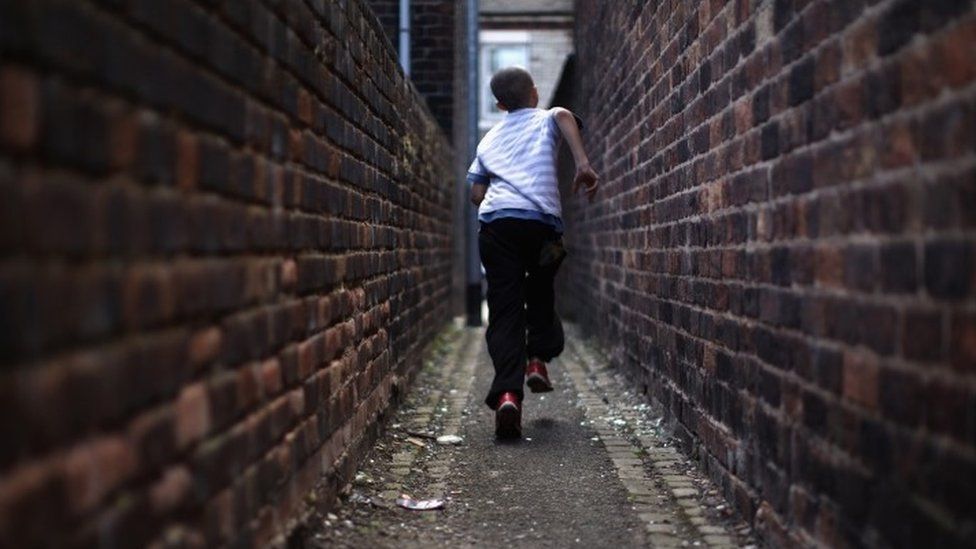'Disappointing' progress on social mobility in England
- Published
- comments

Government progress on improving the life chances of disadvantaged people in England has been "disappointing," according to its own watchdog.
The Social Mobility Commission says ministers have only delivered on 23% of its proposals since 2013.
And it warns in a report that the coronavirus crisis could destroy any gains that have been made.
The government said it was committed to spreading opportunity and "ensuring no-one is left behind by coronavirus".
A spokesperson said the government was pleased the Commission recognised progress in areas such as improving life chances for poorer groups and keeping disadvantaged pupils in education for longer.
But the commission warned that coronavirus was "already having a huge impact on those from all disadvantaged backgrounds, and this will only get worse as the recession bites harder".
"It is now really important to have a coherent and coordinated plan to help the most vulnerable in the months and years ahead," said the commission's joint deputy director Steven Cooper.
The commission says more progress is needed in a range of areas including:
- Poverty - 600,000 more children are now living in relative poverty than in 2012 and this is projected to increase further due to benefit changes and coronavirus, it says in its report
- Schools - At 16, only 24.7% of disadvantaged students get a good pass in English and Maths GCSE compared with 49.9% of all other pupils
- Employment - Half of all adults from the poorest backgrounds receive no training at all after leaving school
- Health - Life expectancy is falling for women in the most deprived 10% of areas, the commission says, and health inequalities linked to socio-economic background have been exposed by coronavirus.
Labour's shadow works and pensions secretary Kate Green said the commission's report "exposes a government with no interest in levelling up Britain".
"It's an appalling record of mismanagement and indifference to the life chances working class families and their children," she added.
The commission was set up by Parliament to hold successive governments to account on many promises made on the steps of No 10: to rebalance the economy, to fight burning injustices, to level up and unite the country.
Although couched in temperate language, this year's report lambasts ministers for their failure to put cross-government measures in place and to turn warm words into reality.
The Department for Work and Pensions is singled out for particular criticism.
Benefit cuts are increasing child poverty, commissioners say, and the DWP "appears to have done little work" to ensure it is not making matters worse.
The government will speak of its commitment to improve life chances for all, but today's report says the pandemic means social mobility has never been more important and it will be the poor and young who suffer most.
The Social Mobility Commission was set up in 2013 by David Cameron's coalition government - but its chairman, former Labour health secretary Alan Milburn quit in 2017, saying Theresa May's government was "unable to devote the necessary energy and focus to the social mobility agenda".
In a State of the Nation report last year, covering England, Scotland and Wales, the commission said that inequality was entrenched "from birth to work" - and little progress had been made on improving the situation since 2014.
Now, in an audit of government departments, the commission has found that "no or very little action" has been taken in England on 31% of the proposals it has made since it was set up, most of which applied to England only.
There has been "insufficient" progress on 46% of its proposals, and strong progress had been made, or the proposal delivered, in only 23% of cases.
'Some success'
Extending 30-hour free childcare to parents working the equivalent of eight hours a week and more funding for adult education are among the proposals the commission says have been ignored by government.
Alan Milburn's successor Dame Martina Milburn, who is not related to the former Labour MP, told the prime minister in April she was standing down to concentrate on her concentrate on her "day job" as chief executive of the Prince's Trust charity.
In a foreword to the commission's new report, Dame Martina says there had been "some evidence of success" in boosting social mobility before the coronavirus pandemic, but renewed focus was now needed if Boris Johnson was going to meet his promise to "level up opportunity" across England.
Her message was echoed by former Conservative education secretary Justine Greening, who stood down at the last election.
'Vulnerable children'
"We've heard a lot about levelling up but too little on the detail. A piecemeal plan, or a plan for a plan, announced in July won't cut it," she said.
A government spokesperson said: "We are pleased the Commission recognises progress in areas such as improving life chances for poorer groups, boosting mental health support for young people, and keeping disadvantaged pupils in education for longer.
"We remain committed to levelling up opportunity across the country, and continue to do all we can to make sure no-one is left behind as a result of coronavirus.
"From the start of the outbreak, all vulnerable children have been able to attend school and we have provided over £100m to support children to learn at home.
"We also continue to invest significantly in schools and early years, alongside raising wages and increasing work incentives for the lowest paid families."
- Published30 April 2019